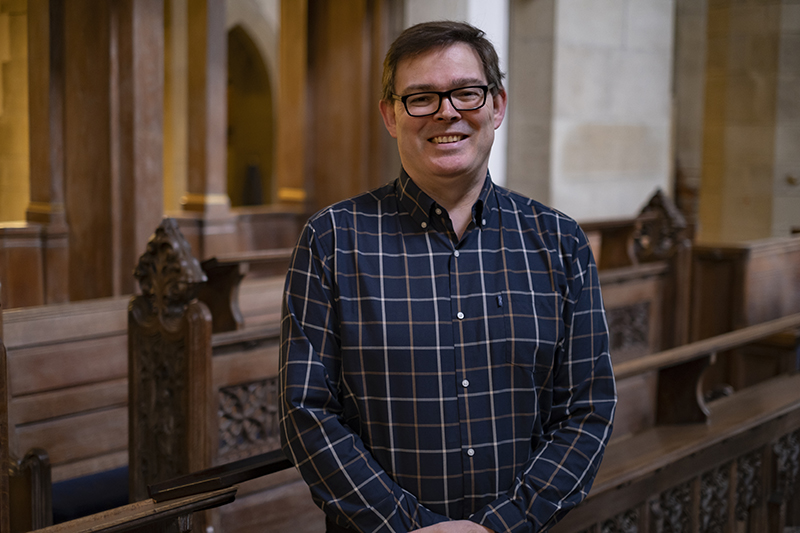On Wednesday 28th February we welcome Anthony Gritten for our eighth organ recital of the 2024 season. In this edition of ‘Notes from an Organist’ we discover more about them, and what to expect from their recital, including enjoying the noise of an organ; going on a mini-pilgrimage in 2024; and playing the complete works of Buxtehude in one day!
Could you introduce yourself, how you got into music / become an organist and your musical journey to where you are today?
I suppose I was always attracted by the mixture of noise, music, and machine that you get from a pipe organ. I was lucky enough to start learning with Harry Gabb, already long retired but full of amazing stories about legendary figures in the organ world. After him I went on to a sixth form music scholarship and thence to Cambridge as an organ scholar. I was in a minor college musically speaking, and it was great to be largely left alone to enjoy the music making.
What can people expect from your recital at Bradford Cathedral?
Hopefully there’ll be something for everybody. There’s a relatively contemporary short piece by Daniel Roth (for many years the titulaire at St Sulpice in Paris), some Bach, a wonderfully elegant and colourful piece by Anthony Gray (your Assistant Director of Music), and – because it’s his centenary this year – a large-scale work by Stanford, his Fifth Sonata, which he wrote at the end of the First World War.
Why do you enjoy playing the organ?
The noise! You can play the same piece on different instruments with hugely different combinations – never the same way twice. It’s also wonderful to work in the historic and often very beautiful buildings – there’s a sense of awe.
Do you have a particular favourite piece out of those you are playing?
I play a lot of Roth’s music, and it’s close to my heart, but at the moment the Stanford sonatas are giving me a lot of pleasure. The Fifth Sonata, which is based on his own hymn tune Engelberg (‘For all the Saints’), has a lot of cracking moments and plenty of excitement.
This season’s theme is ‘Trios and Trio Sonatas’ which features JS Bach’s six trio sonatas in full. Are you playing one and, if so, which one is it, why did you choose this one, and why are you looking forward to playing it?
I only play Bach’s first two Trio Sonatas, and in the end I decided to opt instead for three trios from his Clavierübung III. These are contrasting settings of the Lutheran Gloria: three different keys, three different musical styles, three different meditations upon this glorious melody. Increasingly I find that I prefer the more mystical interpretations of Bach, and these three chorale settings work well in that mode.
What are your hopes or plans musically for 2024?
I have an informal self-imposed project to perform the five Stanford sonatas. In March I’m doing a mini-pilgrimage around five organs, starting with Queens’ College Cambridge where Stanford was organ scholar, and ending in Westminster Abbey, where he is buried. On the back of that, several other venues have asked me to include one or other sonata, so by the time 2024 ends I will have played them 15 times all over the country.
You’ve performed at the St. Sulpice, Paris, including a recital as part of Roth’s 70th birthday celebrations. What was that experience like?
A life-changer. There is nothing like the St. Sulpice organ to make you realise what the music written by the composer-organists there was initially meant to sound like. When Widor says use the oboe, you still pull out the same stop that he used. The 32 foot reed, of course, is apocalyptic!
You once played the complete works of Buxtehude over a 6½ hour recital. What were the challenges of such a lengthy performance?
I subdivided the duration into 6 self-contained programmes (played back to back), so that the audience could come and go as it pleased. This gave a shape to the stamina required up in the organ loft – though, strangely, after about 75 minutes, I stopped feeling tired, and everything just flowed. It was great to end with the dramatic F# minor Praeludium.
You wrote a doctorate on Stravinsky’s neoclassical music – what did you discover through your research?
If I were to sum it up in two points, it would be these. (1) That Stravinsky buried quotations from all sorts of other composers deep within his music (most of which are still un-documented), and that his own compositional method was hugely influenced by how he understood earlier composers to have constructed their music. (2) That he was not the best guide to his own music, and often deliberately led others astray in conversations and writings.
Finally, how would you sum up your upcoming recital at Bradford Cathedral?
A mixture of meditation and celebration!
You can join us on Wednesday 28th February at 1pm to hear Anthony’s organ recital, with an optional £4 buffet lunch beforehand at 12:30pm. You can find out more about him on Facebook or Twitter / X.
You can discover more about our organ recital season on our dedicated page.

